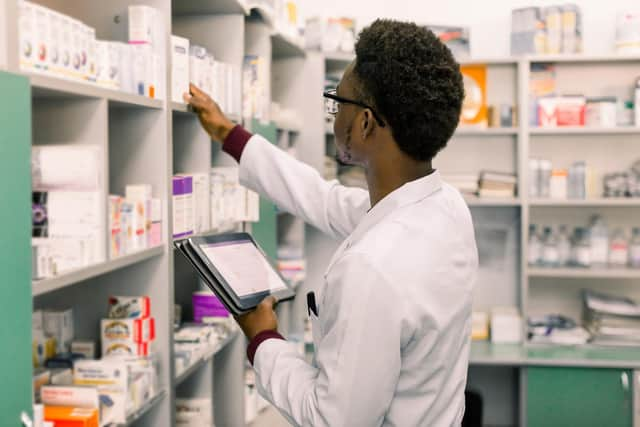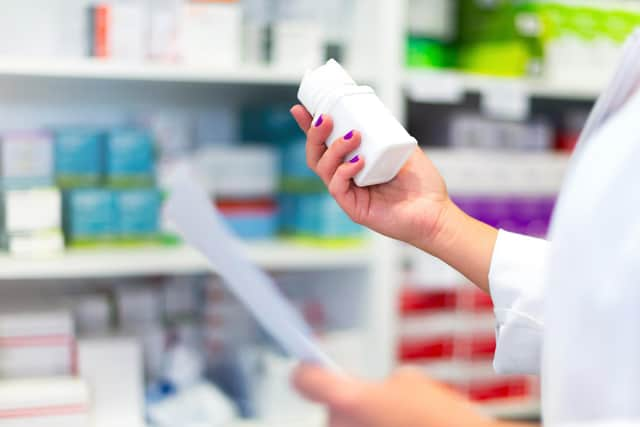NHS medicine shortages 'the worst in 20 years' says Derbyshire pharmacist as Chesterfield diabetes sufferer left without insulin
and live on Freeview channel 276
Philip Bailey, of Chesterfield, who has diabetes, relies on insulin to manage his sugar levels – but due to drug shortages plaguing pharmacies across the country, he has been left without access to it.
He said: "With no access to insulin I have blurry vision and I’m thirsty all the time. I’m trying turmeric and lemon to try and combat it. I’ve been testing my blood sugar and pricking my fingers four times every day to check my sugar level. I stopped doing that because my fingers got too sore.
Advertisement
Hide AdAdvertisement
Hide Ad"Peak Pharmacy at Ashgate told me they called other pharmacies to find out another chemist would provide me with the insulin I need, but no luck. It’s not the first time I’ve had this trouble with getting the insulin. I’ve got to the stage that I don’t care anymore and going to try and live life without it.”


Philip is one of many patients left without access to their prescriptions as the NHS has been struggling with severe medicine shortages over the last two years.
The crisis is thought to be caused by a combination of factors, with Brexit, the ongoing war in Ukraine, the impact of the Covid-19 pandemic, and broader economic instability all playing a part.
In a statement published on Monday, January 15, Janet Morrison, the chief executive of Community Pharmacy England, said that pharmacy teams have been struggling to get hold of prescription medicines for many months but the problem is now worse than ever.
Advertisement
Hide AdAdvertisement
Hide AdThe Derbyshire Times asked pharmacies how the crisis is affecting chemists across the county and their patients.


A spokesperson for Brimington Pharmacy said: “I've been a pharmacist for 20 years plus and I've never seen it this bad.
"This makes our life as pharmacists really difficult. In the past, there might have been 10 or 20 drugs affected by shortages at a time. Now you could have around 100. It's really, really difficult working day to day. It’s been going on for almost two years now. It's not always the same drug either – it’s different drugs at different times.
“We work quite closely with the surgeries and with the manufacturers and wholesalers. And if there is a long-term problem, we always try and try and find a solution for the patient. It's not always easy, but we always try and work something out.
Advertisement
Hide AdAdvertisement
Hide Ad“I think the best advice for patients affected is to make sure that they have plenty of time to react if there is a shortage. The best thing is to go to a pharmacy or GP surgery and speak to somebody to see what can be done earlier than a week before you run out. It means you are buying yourself time. Sometimes we might need to get prescriptions changed, or we might need to order something from a different place. It just gives us time to work something out for patients.”
Steve Hulme, Director of Medicines Management and Clinical Policies at NHS Derby and Derbyshire Integrated Care Board, said: "We recognise the difficulties that people and their carers are currently facing in accessing medicines due to shortages. This is a challenging situation. There are significant issues, outside of our control, both worldwide and in the UK with the supply of medicines and we are being affected in Derbyshire too.
"We advise our health providers, GPs and pharmacists to follow national guidance on prescribing alternative medicines when their first choice medicine is unavailable and we are working together with our local pharmacies and GP practices to ensure patients can continue to get the medication they need. In addition we liaise closely with our Derbyshire NHS Hospitals and specialists based on local circumstances offering local guidance where appropriate."
Comment Guidelines
National World encourages reader discussion on our stories. User feedback, insights and back-and-forth exchanges add a rich layer of context to reporting. Please review our Community Guidelines before commenting.